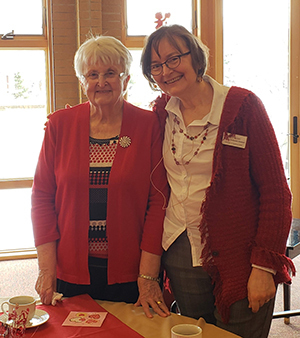Release Date: May 29th, 2020Chaplaincy in Long Term Care - Touched by the Loving Hands of Seniors
 “It’s the best job in the world,” says Bev Suderman Gladwell, recently retired chaplain from Parkwood Mennonite Home. “Where else can you do a walking hymn sing, then share communion with someone who is really fragile, or sit with a family as a loved one experiences end of life?”
“It’s the best job in the world,” says Bev Suderman Gladwell, recently retired chaplain from Parkwood Mennonite Home. “Where else can you do a walking hymn sing, then share communion with someone who is really fragile, or sit with a family as a loved one experiences end of life?”
 Bev Suderman Gladwell was chaplain at Parkwood Mennonite Home for 16 1/2 years. Working with the elderly, she often encountered those who live with dementia. Some residents pace as a result of that condition. Because she knew that some of them were people of faith, she took one by the arm and said “Let’s sing.” They did, and another person joined them. They walked the halls singing hymns together. “There are so many ways to communicate,” she says. “You pick up on other cues of communication with someone who is living with dementia. This was a wonderful way to connect.”
Bev Suderman Gladwell was chaplain at Parkwood Mennonite Home for 16 1/2 years. Working with the elderly, she often encountered those who live with dementia. Some residents pace as a result of that condition. Because she knew that some of them were people of faith, she took one by the arm and said “Let’s sing.” They did, and another person joined them. They walked the halls singing hymns together. “There are so many ways to communicate,” she says. “You pick up on other cues of communication with someone who is living with dementia. This was a wonderful way to connect.”
“To do the work of being a spiritual care provider you have to be strongly rooted in your own faith tradition.”
Called to ministry when she was a young adult, Bev became a student intern at First Mennonite Church in Edmonton where she worked with Gary Harder. She came to Ontario and served at Vineland United Mennonite Church as an assistant to the pastor and a youth worker. After seminary, she worked in an internship, again with Gary Harder, but this time at Toronto United Mennonite Church. This was her first experience in chaplaincy as she worked half time covering a sabbatical at
“Being a spiritual care provider opened my eyes to other ways that God works in the world. It broadened my spiritual tapestry.”
Jane Finch Ministries in Toronto. From there she moved to Port Rowan and ministered at Erie View United Mennonite Church for five years. She then found her way to Parkwood Mennonite Homes as a spiritual care provider.
“To do the work of being a spiritual care provider you have to be strongly rooted in your own faith tradition,” says Bev. “I provide spiritual care to everybody, no matter what their background. That is a distinct difference from being a pastor in a Christian church where your job is to share the good news of Jesus Christ and equip your people to do the same. As a spiritual care provider, my job is to find out what nurtures you and then help you find ways to continue to be nurtured in that way.”
"I had an amazing opportunity to minister to people in the last years of their lives. And that is a sacred calling."
When Bev stepped out of her office at Parkwood, her ministry was right there — only a few steps away. She easily found people who needed her as she walked floor to floor. Working in a team was a great benefit. Nurses, physicians, recreation therapists and program directors were some of the people with whom she interacted each day. “We were all focused on the same people,” she says. “I could simply check with staff on a resident I was concerned about. We looked after our people together.”
Chaplaincy is a specialized ministry. Your own faith tradition must recognize you as clergy. Often there are rigorous training and accreditation processes. Chaplains can be paid less than congregational pastors are, at least in the long-term health care system. “You may be paid less, but you don’t have evening and weekend meetings, and you have a team of professional colleagues around you. You gain a beautiful community in which you are working,” Bev says.
In 2009, Bev was ordained to special ministry as a chaplain at a service held at Parkwood Mennonite Home. Her home congregation, Waterloo North Mennonite Church, recognized her as a ministering person and requested her ordination from MCEC.
“Being a spiritual care provider opened my eyes to other ways that God works in the world, and not just in my corner of it. It broadened my spiritual tapestry,” she says. “For me chaplaincy was always this wonderful mix of working with the elderly and interacting with their families. I had an amazing opportunity to minister to people in the last years of their lives. And that is a sacred calling.”